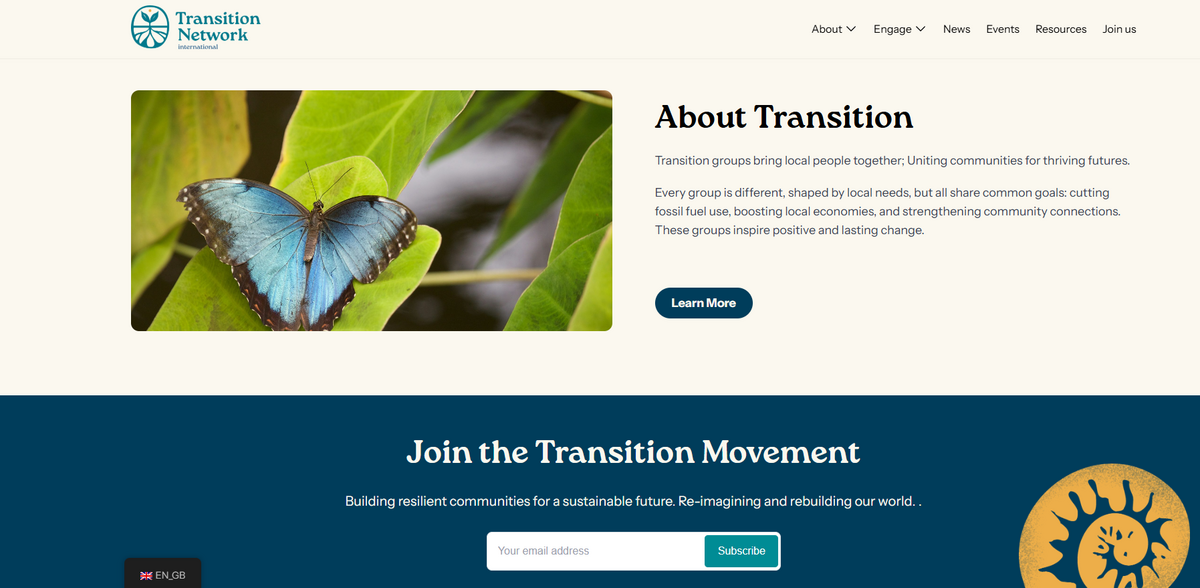What the Project Is
Transition is a movement built by local people coming together to forge thriving futures… Born as a response to the urgent need for change, local groups unite communities by cutting fossil fuel use, boosting local economies, and strengthening community connections. This inspiring project started in Britain and Ireland back in 2006, and it has since blossomed into an international network spanning 67 countries. Transition represents a shift from one way of living to another, focusing on community-led actions and practical projects like renewable energy initiatives, local food production, new business ventures, reintroducing nature into urban settings, and building strong bonds between people and organisations. Each Transition group is unique—shaped by local needs—yet they all work toward a common vision: creating supportive, inclusive, healthy communities.
Main Benefit and Key Figures
The project brings clear benefits through a range of key activities and solid achievements:
- Communities across 67 countries work together to reduce dependence on fossil fuels.
- Transition groups stimulate local economies with innovative projects and local food initiatives.
- They foster a strong sense of belonging and care, addressing social injustice along the way.
- The movement began in 2006 and has grown quickly, offering training services and a global mapping service.
- Local hubs support these groups with knowledge sharing, events, and funding opportunities.
Each of these points highlights the main benefit of empowering communities to create transformative, sustainable change.
Embracing the Spirit of Change
Transition is all about change—a change in thinking, structure, and practice. The approach champions local, community-led decisions. It encourages engaging narratives, supports inner transformations, and emphasizes living within resource limits to build resilience. With a conversational and approachable tone, the project invites everyone to tap into their potential. The idea is simple, yet profound… to work together in creating a region that cares for both people and nature. Transition isn’t just about grand projects; it’s the sum of small, practical actions that spark a larger movement.
Supporting Local Groups and Hubs
At the heart of the Transition movement lie the local groups. These groups consist of local people who come together, influenced by their unique local culture and challenges, to build a sustainable future. Supported by regional and national hubs, these local initiatives become part of a broader network that provides guidance, inspiration, and resources. The hubs help groups share ideas, manage local projects, and build alliances. This networked approach makes the movement resilient, dynamic, and responsive to the changing needs of communities.
Organising Through Sociocracy
Transition Network International takes a sociocratic approach to organising its international work. This means that every voice can be heard and every idea matters. In practice, meetings allow everyone to speak, listen, and contribute equally. This inclusive way of organising helps ensure that the project remains flexible and responsive to local conditions, while still adhering to clear ethical principles. The practice of shared decision making strengthens relationships and fuels the creative energy essential for building positive, lasting change.
Project Impact on Sustainable Development Goals
- SDG 7: Affordable and Clean Energy – Through renewable energy projects.
- SDG 11: Sustainable Cities and Communities – By bringing nature back into cities and building resilient communities.
- SDG 13: Climate Action – With efforts focused on reducing reliance on fossil fuels and cutting harmful emissions.
- SDG 9: Industry, Innovation, and Infrastructure – By supporting local businesses and promoting sustainable economic practices.
- SDG 12: Responsible Consumption and Production – Encouraging local food production and energy efficiency.
Principles and Funding of the Movement
The ethos of Transition is built upon core principles such as respecting resource limits, fostering inclusivity, promoting subsidiarity, and maintaining balance among all stakeholders. These principles nurture an environment where ideas and power are shared freely, and collaboration is at the heart of every action. Operating as a charity registered in England and trading as Transition Network International, the project is largely funded through grants from charitable trusts and foundations and by the generosity of individual donors. With each contribution, communities are enabled to co-create imaginative narratives and visions—step by step, action by action—toward a fair, robust, and healthy future.


















